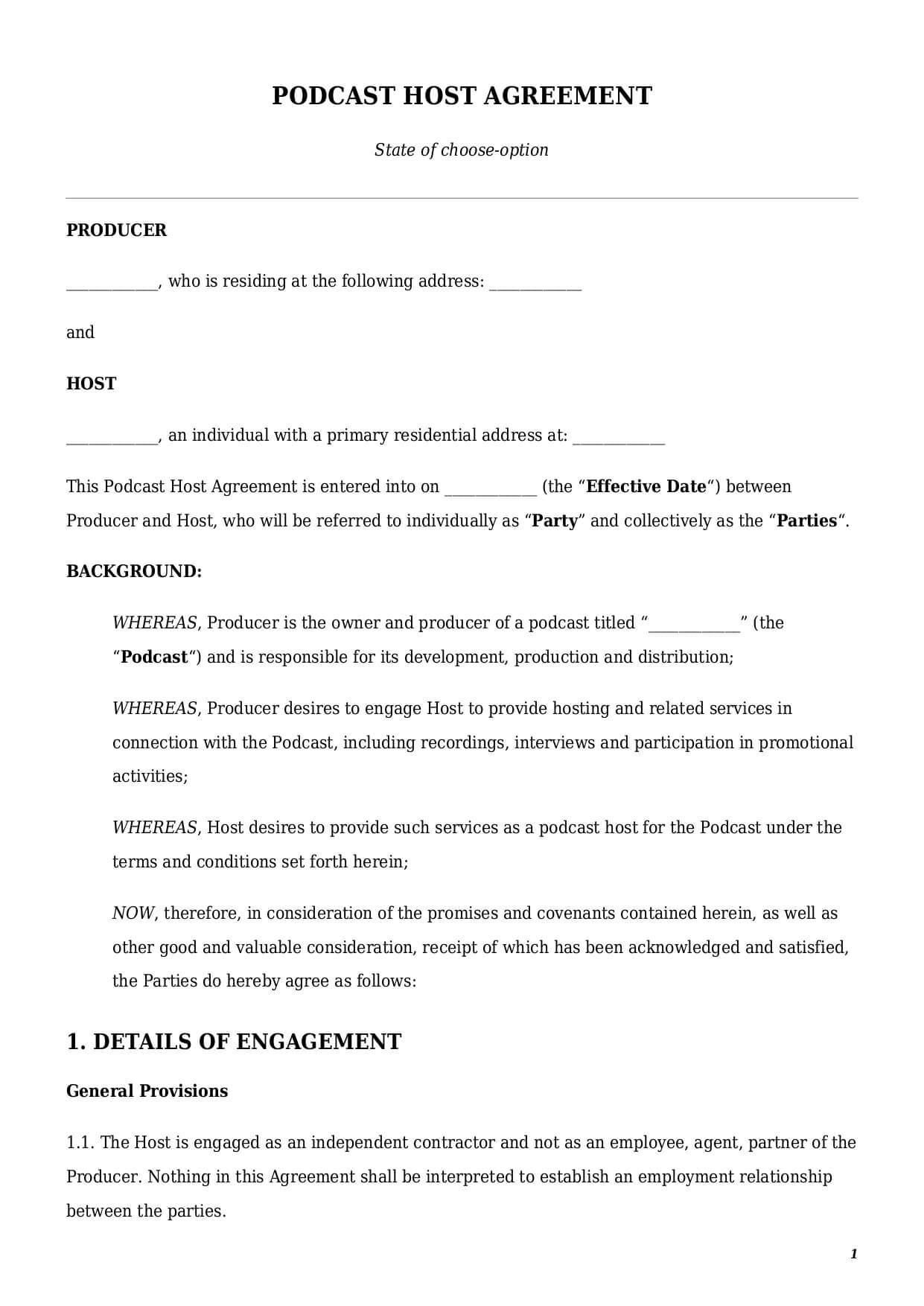Podcast Host Agreement
Reviews


What is a podcast host agreement?
A podcast host agreement is a legal document that outlines the roles, responsibilities, and expectations between a podcast producer and a podcast host. It sets the terms of collaboration, ownership of content, compensation, and more.
The parties involved in a podcast contract agreement are a producer and a host.
A producer is usually a company or individual who has an idea for a podcast, as well as the necessary financial resources for its creation and production. While a host is an individual who will appear on the show, speak to the guests, and represent the voice and personality of a podcast. It could be any individual, including actors, sports trainers, or simply individuals with valid presenter experience.
This podcast agreement may appear similar and thus shall not be confused with:
- podcast guest agreement (when a guest is being invited to a podcast);
- podcast employment agreement (when a producer or a host hires a technical team like an editor or a sound checker to make a podcast).
Top 7 Things to Include in a Podcast Host Agreement
Drafting a podcast host agreement template from scratch is a challenging task for everyone. It is very easy to omit the inclusion of important clauses at the very start, which may lead to unpleasant consequences.
Every contract usually has two sets of clauses—general and specific. General clauses are are common for many contracts and are essential for a document to be a complete legal arrangement. General clauses include:
- details of the parties involved (i.e., a producer and host);
- information about the podcast (its name and number of episodes);
- limitation of liability clause;
- disputes resolution clause;
- governing law;
- parties’ mutual warranties and indemnification.
Having the provisions listed above is a must-have for every agreement. However, specific clauses are meant to tailor a legal document to a party’s specific needs and circumstances.
Below you can find a list of very specific clauses every podcast host agreement template should have.
Recording Responsibilities
The first thing is the detailed list of recording responsibilities. That list could be structured in several groups:
- Recording Schedule: This is the exact date and time on which recordings of episodes should take place. The schedule shall also include the number of episodes, location of recordings, duration of each episode, etc.
- Recording Duties: This is the list of rules and conditions a host shall follow. It may include how the sessions could be rescheduled, what happens if a host cannot attend a recording episode, etc.
Clearly defining obligations helps to avoid scheduling issues and ensures both parties are prepared for the recording process.
Editorial Content Review
In a podcast host agreement where a host is merely hired for recording and hosting, all editorial rights belong to a producer. This means that a producer has a sole and exclusive right to select topics for episodes and guests and to write and approve scripts and content.
In a situation when a host is also a co-producer for a podcast, things may get more complicated. A host may wish to have a bigger scope of editorial rights. Therefore, a podcast host agreement sample shall define each party’s role in editorial content review.
Compensation Package
A solid podcast agreement example should lay out the host’s compensation structure. In other words, how much, when, and how the host should be paid for their services. The producer may offer various compensation package:
- fixed remuneration (rarely);
- fee per one episode;
- fee per season.
For a podcast agreement, it is common to include additional bonus compensation for a host depending on the number of downloads, listeners, and other performance-based results.
Finally, a podcast agreement sample may also include a compensation package for a host to cover all expenses incurred during recordings. Those expenses may include transportation to and from a recording studio, lunches, hotels, etc.
Exclusivity
Every podcast agreement sample shall define if relations between a producer and a host are exclusive or not. Exclusive relations mean that a host cannot participate in any other podcast, including being its producer, founder, or co-host.
In non-exclusive relations, a host may not be allowed to participate in podcasts that directly compete with a producer’s podcast. Direct competition means that podcasts have a similar nature and address the same domain of interest or reach the same audience.
Public Appearance of a Host
Many podcast contract agreements may include the host’s public appearance duties. This is usually required to promote further podcasts in public, including on social media, and may include:
- participation in media events or interviews;
- recording of additional audio or video snippets;
- public speaking, etc.
A host’s identity is closely associated with a podcast. Thus, producers tend to incorporate a simple code of conduct for a host’s public appearance in the text of a podcast agreement. Usually this is a simple list of “dos” and “don’ts” a host shall follow. Those rules may include dress code, topics allowed to be discussed in public, or comments to be made.
Termination
Parties enter into a podcast contract agreement for a specified period of time for the purpose of creating, recording, and releasing it. Therefore, the text of a final contract should include the start and the end date of such cooperation.
As a rule of thumb, each party should have a right to end a podcast agreement at any time. To do so, a withdrawing party shall submit a prior written notice to inform the other party about termination. Thus, the text of a final contract shall define the exact notice period either party has to follow to terminate the contract.
Finally, either party should have a right to immediately end the contract at any time. Usually, a podcast agreement sample includes a list of very specific circumstances allowing immediate termination:
- Material breach: A party can end a contract at any time if the other party commits a material breach. The examples of a material breach may include, for instance, a host’s lateness for recordings or failure to attend recordings at all.
- Common grounds for termination: This is when a contract cannot be performed further due to either party being sick, mentally disabled, bankrupt etc.
- Other grounds for termination: Parties are free to include any other triggering events that may become a ground for a contract’s immediate termination. For instance, a host might not be allowed to attend any social gatherings and drink alcohol during the period of the podcast’s recordings. Failure to follow such a requirement may result in a contract’s immediate termination.
Ownership of IP Rights
In a good podcast agreement example, parties always define who will be the owner of intellectual property rights created under the contract.
The first step is to define what is covered by IP rights in a podcast agreement. Usually, the podcast content includes all scripts for episodes, ideas and topics, final episodes, etc. In most of the cases, the producer may wish to be the owner of all rights. However, parties may always share ownership together or define which IP objects will belong to one party and which shall belong to another.
Once the party becomes an owner of certain IP rights, such a party has an exclusive right to license, sell, modify, publish, and perform other actions.
How to customize a legal template at Faster Draft?
To get a fully personalized template of a podcast agreement, follow a few easy steps below:
- Click the button “Create Document.”
- Answer simple questions in the form.
- Select a document’s format—podcast agreement PDF or Word.
- Make a payment.
- E-sign, download, print, and use your customized legal document template in minutes.
Table of content
Frequently Asked Questions (FAQ)
-
1. What is the difference between an employment agreement and a podcast contract agreement?
Under an employment agreement, a company hires a person to perform a number of regular tasks and duties under an employer’s supervision. Relations in this type of contract are known as employment relations. In an employment agreement:
- An employee usually gets a number of additional benefits like social security, paid insurance, or retirement plans.
- An employee is usually dependent on the employer’s internal rules, policies, and guidelines; and
- Employee’s liability is limited to his/her salary.
A podcast contract agreement is not an employment contract. This is a contract between two independent parties. One party is an owner of a podcast who wants to promote and produce it further. Another party is an individual who is being invited to become a host of a podcast. In a podcast agreement:
- A host does not receive any benefits or perks as an employee may get under an employment contract.
- Parties are free to end the contract at any time.
- In case of a material breach of a contract, either party shall be liable for paying compensation to another party.
-
2. What is the difference between a service agreement and a podcast agreement?
A service agreement is a legal document by virtue of which one party provides certain services to another party in exchange for agreed remuneration. A podcast agreement is a special type of services agreement where a person delivers their services as a host to a producer of a podcast.

Looking for something Different?
Start typing to find out our collection of legal documents and contract templates
